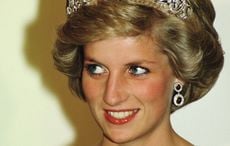Brendan Bracken, Winston Churchill’s closest confidant in politics, was an immigrant to Britain who renounced his Catholic faith and tried to keep his Irish background a secret.
Churchill’s son, Randolph, described Bracken as “the fantasist whose dreams came true.”
A minister of information in Churchill’s government during World War II, Bracken is unique as the only person brought up as an Irish Catholic to have served in a 20th century British government, the Irish Times recently reported.
He also held tremendous influence as the founder of a newspaper empire that includes the Financial Times and the Economist.
He is remembered for opposing the Bank of England's co-operation with Adolf Hitler, and for supporting Churchill's prosecution of World War II against Hitler.
Bracken was born in Tipperary, the third of four children. His father, Joseph Kevin Bracken, a prosperous Templemore builder, was a Fenian and a founding member of the GAA. His father died 1904, when Brendan was three. His mother Hannah moved the family, four children and two stepdaughters, to Dublin’s north side.
Bracken spent four years at the Christian Brothers' O’Connell School. A young delinquent, he skipped school and organized a gang that vandalized neighbors’ gardens. He was sent off to Mungret, a Jesuit boarding school in Limerick, but he absconded.
In 1916, his mother gave him £14 to go to Australia, where a cousin was a priest. Brendan led a nomadic existence, moving between Catholic religious communities and doing some teaching, for three years. He read incessantly to educate himself.
He visited home for a short time in 1919. After discovering that his mother had remarried, he moved to Liverpool, posing as an Australian.
He claimed he was four years older than he was and got a teaching post.
With the money he earned, he sought admission to Sedbergh, a public school in Yorkshire. He made up a story that his parents had died in a bush fire in Australia and had left him money to finish his education. He was only there for one term, but it gave him the important label of “a public school boy.”
Bracken stood over 6ft tall and was described as having “a large mop of red hair that stood out as a kind of halo.” He was said to have a commanding presence and intimidating manner and could be alternatively ingratiating and overbearing.
After doing some more teaching, he set out to become part of the British establishment by volunteering to organize an election campaign for Churchill. He grew so close to Churchill that a rumor spread that they were father and son.
He also established himself in publishing and built up a group of newspapers, including the Financial News (later to merge with the Financial Times) and the Economist.
He set himself up in a townhouse in Westminster with a butler, cook and chauffeur and acquired works of art. He remained a bachelor and his private life remains something of a mystery.
“Everything about you is phony, Brendan; even your hair, which looks like a wig, isn’t,” an acquaintance once said about him.
Bracken was elected MP for North Paddington in 1929. His opponents, who sensed something phony in press accounts of his background, spread the rumor that he was a Polish Jew.
The Irish Times reports that he was forced to exhibit his Templemore birth certificate on a circular stating that “Mr Bracken is British by birth and comes of a long succession of generations of British stock without any intermixture of foreign blood.”
Bracken attached himself politically to Churchill. “We were” Bracken would say, “a party of two.”
When Churchill joined the government at the outbreak of the war, Bracken stood by his side, briefing the press. He played a crucial role in the maneuvers that led to Churchill's rise to prime minister in May 1940.
Bracken, who moved into the bunker annexed to 10 Downing Street, wielded immense influence as Churchill’s confidant. He was able to restrain the headstrong prime minister and head off confrontations. Because he was friends with many influential Americans, Bracken helped pave the way to Anglo-American cooperation.
The Irish Times writes: “Conscripted by Churchill to a languishing ministry of information, Bracken won universal acclaim. A master spin doctor decades before the term was invented, he wooed the press privately and in conference with tidbits of inside information. He stood up to Churchill to ensure that the press and the BBC had access to news and reasonable freedom."
He served briefly as the First Lord of the Admiralty at the end of the war. A leading Tory spokesman at the postwar general election, he was one of those most blamed for their defeat.
In 1951, Bracken, citing poor health, turned down office as Colonial Secretary in Churchill’s last government and retired from politics. He was made Viscount Bracken but never took his seat in the House of Lords. He remained close to Churchill and helped to cover up his stroke in 1953.
Bracken died from cancer in 1958 at the age of 57. On his deathbed he told his nurses not to admit Irish priests who wanted to reconcile him to the faith of his childhood.
Although he had an abrasive manner and later in life became melancholic and reclusive, Bracken was well remembered for many kindly actions. Those who knew him raised £42,000 to fund a reading room commemorating him in the new Churchill College in Cambridge.
He also remained devoted to his mother and frequently sent her affectionate letters up to her death in 1928. After she died, he stopped visiting Ireland but continued to support needy family members, although he avoided personal contact with them.
The letters to his mother, which have never been seen by the public, as well as other memorabilia, are part of an exhibition on Bracken titled “Churchill and the Irishman” at the Little Museum of Dublin.
“The twists and turns of Bracken’s life are an affront to anyone who has a narrow view of what it means to be Irish,” said museum director Trevor White. “We can’t wait to share this extraordinary story with a new generation of global adventurers.”
The exhibition runs until September 25.




Comments